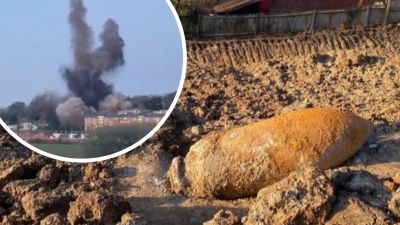Exeter WW2 bomb: What's happened in 76 hours since builders discovered the explosive

Hundreds of people in Exeter have spent a third night away from home after World War Two bomb was found near the university.
What police have described as a 1,000kg Nazi blitz device was found by builders on Friday 26 February.
At one point, more than 2,000 homes were evacuated as the Ministry of Defence and police worked at the scene.
A controlled detonation of the bomb took place on Saturday 27 February, with the explosion seen and heard across the city.
The blast was so fierce, people have reported broken windows and damage as a result.
Here is how the events unfolded over the weekend...
Friday morning: 'Major incident' declared
Officers were called to Glenthorne Road in the St James area of the city at around 9.20am on Friday 26 February.
A number of nearby roads were closed and an Exeter University halls of residence was evacuated.
A spokesperson for Devon and Cornwall Police said: "Police were called to Glenthorne Road, Exeter at around 9.20am this morning following reports that a possible unexploded WW2 device has been located.
"A 100m cordon is currently in place and number of nearby properties are currently being evacuated.
"The cordon size may change in due course.
"The Navy EOD are also on scene and the incident is ongoing."
Friday evening: 'Quite a large ordnance'
Around 100 properties had been evacuated by the end of the day and the military was brought in to make the device safe.
Police said people may not be able to return to their homes until tomorrow after "quite a large" unexploded bomb was discovered.
They said it is not unusual to find unexploded devices in Devon, but one of this size is "uncommon".
Inspector Roper said: "It's approximately 2.5m in length by about 70cm in width.
"We're fully aware that this is probably decades old but the moving of this item does pose a risk and we need to make sure we do everything we can to support the locals."
When asked how long it might take to remove the device, Inspector Roper said it would likely go into Saturday 27 February.
Saturday morning: Thousands of properties evacuated
The cordon around the bomb was extended to 400 meters on Saturday 27 February and around 2,600 properties were evacuated, including 1,400 Exeter University students.
A notice was handed out to residents asking them to leave their homes by 9am.
Trains out of Exeter were replaced by buses as the larger cordon fell across the railway line between Exeter St Davids and Taunton.
Devon and Cornwall police released a statement saying: "Residents should be reassured that military, police and partners are working to maintain public safety.
"Exemptions in COVID-19 social distancing rules exist for matters of public safety such as this."
Saturday evening: Controlled explosion carried out
At around 6pm on Saturday 27 February a controlled explosion was carried out by the Ministry of Defence and Devon and Cornwall Police.
The explosion left some houses with windows blown-out and doors knocked off their hinges.
One resident, who wishes to remain anonymous, took photographs of the destruction showing mud over the decking and broken door frames but he feels it could have been worse.
He said: "We weren't the worst hit, the others right next to the area suffered the most.
"But, still, it's not nice to come home and see your house broken like this."
The resident says he had to sleep in his car for two nights after he was denied access to his home.
Other properties in the area have also been damaged after a controlled explosion was carried out by Devon and Cornwall Police and the Ministry of Defence.
Sunday: Residents advised to work on 'worst-case scenario basis'
Devon and Cornwall Police said: "Extensive, multi-agency building assessment work is continuing this morning within the 400-metre cordon of the WW2 bomb detonation site on Glenthorne Road, Exeter.
"Every effort is being made to ensure the timely conclusion of the assessments in the hope some evacuated residents may be able to return home this evening."
Evacuated residents were advised to work on a worst-case scenario basis, that they would not be able to return home that evening.
The council confirmed those already in hotel accommodation will be able to stay there.
Monday morning: 'People's safety is paramount'
Hundreds of people have spent their third night away from home after the bomb was discovered on Friday 26 February.
While people living in the 400 metre cordon were able to go home in the evening on Sunday 28 February, those living within the original 100 metre zone have still not been allowed to return.
Police have said that "people's safety is paramount" while "extensive and crucial safety assessment work" is being carried out by multiple partner agencies.
They have also thanked everyone impacted for their patience and understanding.
More updates to follow.
Read more: